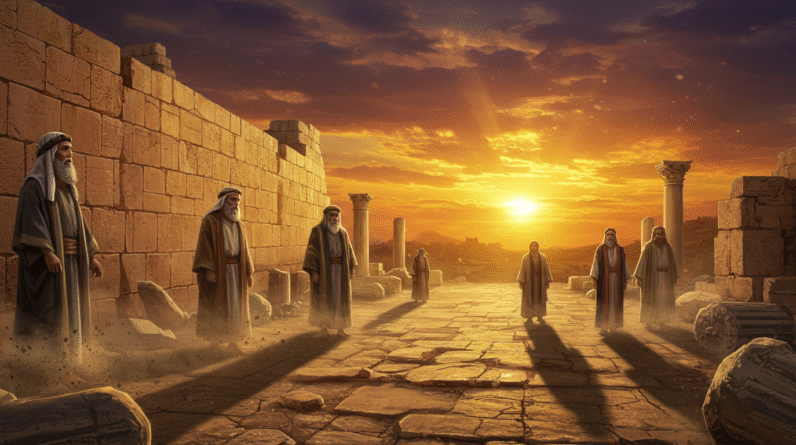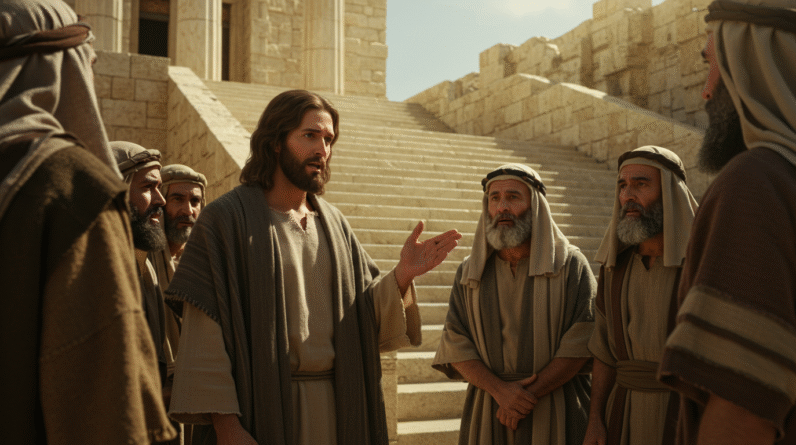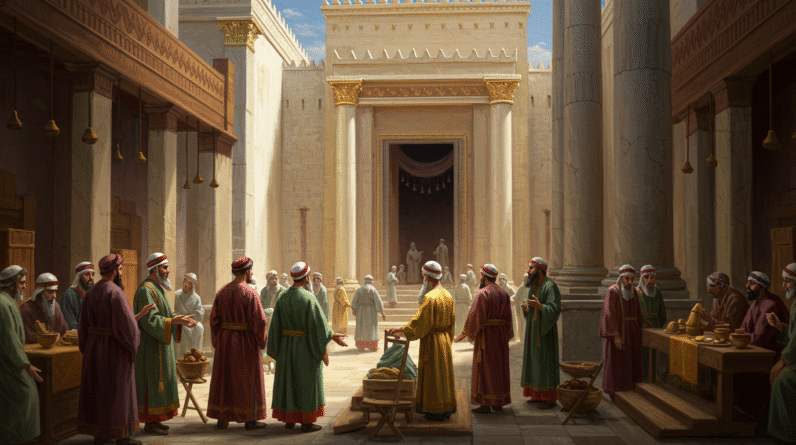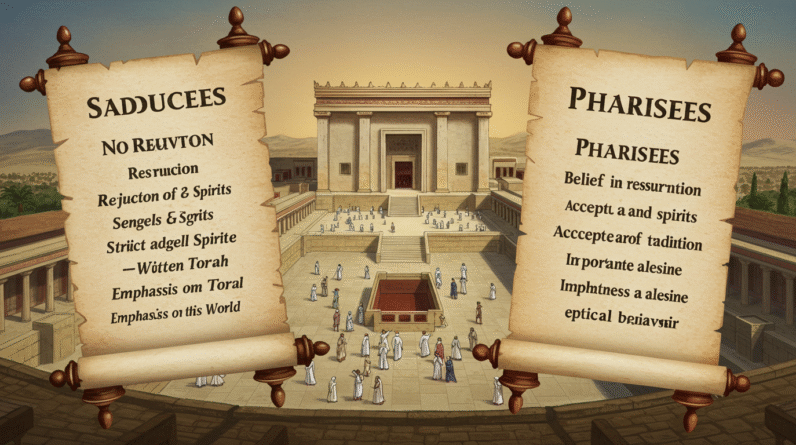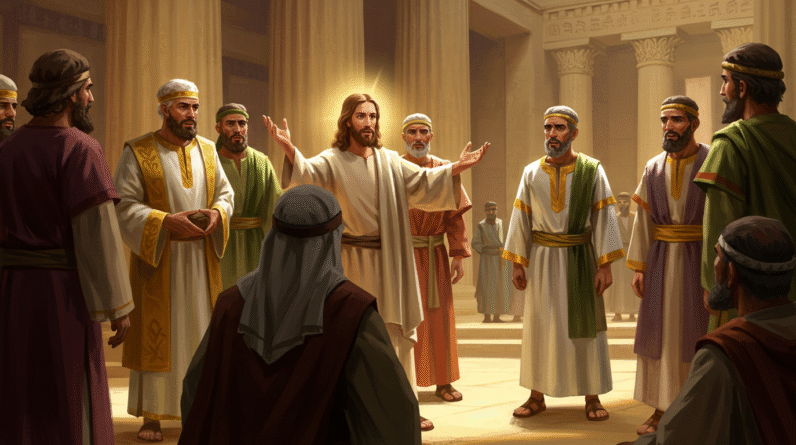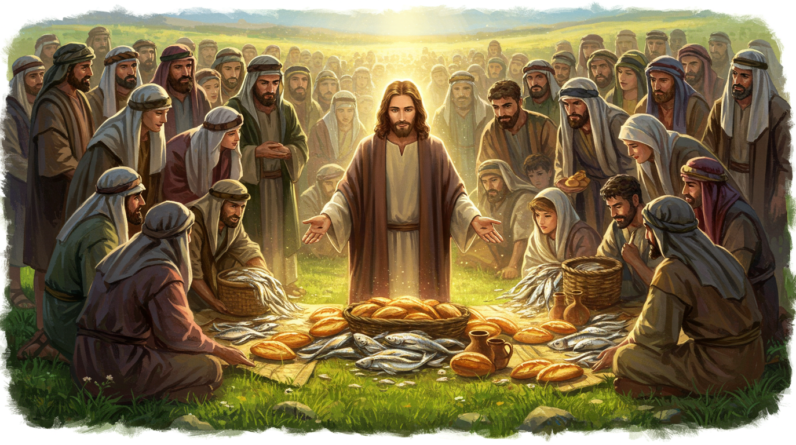Explore the profound moment at Pentecost from Acts 2:1-13: diverse crowds united by faith, the Holy Spirit, and a transformative event that sparked global change.

The Crowd at Pentecost – Acts 2:1-13
Introduction
In the vibrant tapestry of scriptural history, the Day of Pentecost stands as a significant turning point, woven deeply into the fabric of what would become the early Church. This day, encapsulated in Acts 2:1-13, brought together a diverse crowd in Jerusalem, unified not just by their faith but by a supernatural experience that changed the course of Christianity. Imagine the scene: people from various nations gathered for a Jewish festival, only to witness an event that defied natural explanation. The phenomenon of Pentecost didn’t just mark the coming of the Holy Spirit but also embodied the spark that would ignite the spread of the Gospel worldwide.
The Scene on the Day of Pentecost
Jerusalem, a city teeming with energy and anticipation, was alive with visitors celebrating the Feast of Weeks. Jews from different lands traveled to partake in this pivotal festival. It was during this momentous occasion, while 120 of Jesus’ followers were gathered together, that the miraculous event took place. Suddenly, a sound like a violent wind resonated through the room, filling the space with an undeniable presence, and tongues of fire appeared, resting on each of them. This was no natural phenomenon; it was the Holy Spirit, descending upon the disciples and enabling them to speak in various languages.
This bewildering scene attracted a large crowd, and people’s astonishment grew as they heard the disciples speaking in their own native tongues about the wonders of God. The immediate question in the minds of the onlookers was, “What does this mean?” While some marveled, others sneered, attributing the disciples’ behavior to drunkenness. Yet, this event was the fulfillment of a prophecy that transcended human explanation and opened the doors to a new era of faith.
Diverse Crowd, Unified Purpose
The events of Pentecost occurred amidst an eclectic mix of people. The narrative specifies that there were “Parthians, Medes and Elamites; residents of Mesopotamia, Judea and Cappadocia, Pontus and Asia, Phrygia and Pamphylia, Egypt and the parts of Libya near Cyrene; visitors from Rome (both Jews and converts to Judaism); Cretans and Arabs” (Acts 2:9-11). This detail signifies a profound moment of unity among diversity. The Holy Spirit, by enabling the disciples to speak in varied languages, symbolized the breaking down of barriers and heralded a universal Gospel.
In this melting pot of cultures and languages, a singular message became accessible to all: the wonders of God. This is a pivotal reminder of the inclusive nature of God’s message, transcending social, cultural, and linguistic barriers. The crowd’s diverse composition emphasized the universal reach of Christianity, signifying that God’s love is not confined to a specific group but is available to all who seek it earnestly.
Lessons from the Day of Pentecost
The Day of Pentecost extends far beyond just a narrative of miraculous language; it is a profound lesson in faith, unity, and divine purpose. From this historic event, several key lessons emerge:
- The Power of the Holy Spirit: The sudden baptism of the Holy Spirit signifies God’s incredible power, capable of equipping and transforming His followers. The disciples, once fearful and in hiding, became bold witnesses of the Gospel, illustrating the transformative power of divine intervention.
- Unity in Diversity: The presence of various cultures and languages highlights the Church’s mission to unify people worldwide. It points to the Church’s role as a binding force that unites differences under a common faith.
- The Fulfillment of Prophecy: Peter’s address to the crowd, explaining the events as the fulfillment of Joel’s prophecy, emphasizes God’s promises of reliability. It reassures believers that God’s plans are sovereign and will manifest in His perfect timing.
These lessons offer rich insights into the nature of faith and community within the Church, encouraging modern believers to embrace diversity and seek the Holy Spirit’s guidance.
Connection to Today’s World
Fast forward to the present day, and the Day of Pentecost continues to hold relevance, echoing through the corridors of time to speak to contemporary challenges. In a world increasingly divided by socio-political and cultural barriers, the message of Pentecost serves as a rallying call for unity and understanding.
Imagine a society that fully embodies the spirit of Pentecost, where differences in language, ethnicity, and belief are celebrated, not tolerated, as enriching elements of our shared humanity. Such a perspective encourages us to tear down walls that divide and instead build bridges that foster community and mutual respect.
Moreover, as believers, the charge remains to be vessels of the Holy Spirit, embodying His love and power in our everyday lives. Every action and interaction is an opportunity to reflect the transformative power witnessed on that remarkable day in Jerusalem. In workplaces, communities, and families, Pentecost challenges us to be bold witnesses of faith, seeking to inspire and uplift.

Key Bible Verse
A verse that encapsulates the heart of the Pentecost event is found in:
This verse aptly captures the essence of the extraordinary event—ordinary people becoming vessels of divine power, capable of extraordinary deeds. It serves as a reminder of the Holy Spirit’s active presence in believers’ lives, enabling them to fulfill God’s purpose beyond what human ability can achieve.
Thought-Provoking Question
As you reflect on the events at Pentecost, ask yourself: In what ways can you embrace the Holy Spirit to become a unifying force in your own life, bringing messages of hope and love to a fragmented world?
Optional Add-Ons
Historical/Cultural Context
The Feast of Pentecost, also known as Shavuot, was celebrated 50 days after Passover, commemorating the giving of the Law at Mount Sinai. Its significance lay not only in its agricultural roots but also as a spiritual renewal time. This setting provided a fitting backdrop for the advent of the Holy Spirit, marking a new covenant between God and His people.
Comparison with Other Characters
In the Bible, individuals such as Jonah had responsibilities to deliver God’s messages beyond cultural boundaries, mirroring the disciples’ experience at Pentecost. Jonah’s reluctance contrasts starkly with the eagerness displayed by the Spirit-empowered disciples, teaching us the value of embracing God’s call wholeheartedly.
Prayer
Let us pray: “Holy Spirit, fill our hearts today as you did on Pentecost. Give us the courage to speak your truth boldly and the wisdom to embrace diversity as a gift from You. Guide us to be vessels of your love and light in a world that longs for hope and healing.”


